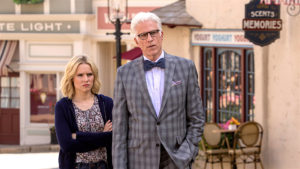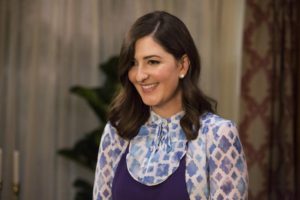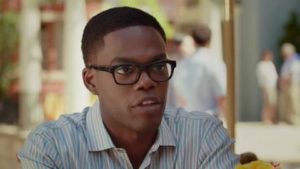8. The Good Place
The Good Place and the Perceptions We Can’t Control
Louis CK has a great bit in his stand-up: “You know, like, when you say to a friend of yours, ‘You’re being an asshole’, and they’re like, ‘No I’m not’? Well, it’s not up to you if you’re an asshole or not! That’s up to everybody else.” Typical of CK’s brand, it’s both a funny and insightful observation, commenting on the frequent social faux pas of people believing that they are the ones who get to define how others see them. Put another, more wanky way, Jean-Paul Sartre posits in his play No Exit that “Hell is other people.” His meaning is often misconstrued: it’s not that being around others is so inherently unpleasant as to render our existence miserable but, rather, that it is impossible to live our lives in a vacuum separate from gazing eyes, to forego the external perceptions that will always shape and dictate who we are in this world.

Such is the premise of The Good Place, a high-concept sitcom from Michael Schur (Parks & Recreation, Brooklyn Nine-Nine) set in an idealised version of the afterlife that is overseen, as it should be, by the benevolent, inimitable Ted Danson. To gain access to The Good Place upon death, you need to live a life of total asceticism, dedicated to helping others while eschewing any deviant or venal impulses that come very naturally to us as the gross, slushy-loving human beings that we are. In other words, you must appear, or at least aspire to be, perfect. Enter Elanor Shellstrop (national treasure Kristen Bell), a woman who once ditched a friend’s pet that she was meant to be minding for a weekend to go to a Rihanna concert. No, it didn’t starve to death, because Elanor was considerate enough to pour the entirety of it’s food out in a few separate bowls so the dog could sustain itself while she was away; cut to the pet’s owner accosting Elanor on the street a week later, towing the morbidly obese dog in a wagon.
Needless to say, Elanor does not belong in The Good Place. What is touted as an infallible system for judging and allocating people to where they deserve to go (oh yeah, there’s totally a Bad Place for those who fuck up royally) has made a grievous mistake when it comes to her. Of course, knowing this and being the sort of person that she is, Elanor has no inclination to let slip that her’s is a case of mistaken identity and that she was really a sack-hole of a woman while on Earth. The only person that Elanor feels she can trust with this information is Chidi (William Jackson Harper), the ostensible soul mate she is paired with upon arrival who, of course, was an ethics professor until his death. Hilarity ensues.

That’s not intended to sound dismissive: in the early-going, this show is nothing less than amusing and, by the end of it’s first nine episodes, actively and uproariously fucking funny. Pick any part you like: Ted Danson’s Michael trying and regularly failing to understand human culture and basic functions, such as suspenders and sweating; Chidi’s wide-eyed incredulity at everything that interferes with enjoying this so-called paradise; the comprehensive list of pros and cons that affect your ranking in life (End Slavery = +814292.09 points; Use “Facebook” As a Verb = -5.55 points). For my money, easily the funniest part of The Good Place is D’Arcy Carden’s Janet who acts as The Good Place’s answer to Siri, an ultra-competent helper that appears whenever her name is said. In the show’s best scenes, she is programmed to beg for her life when threatened with being rebooted, complete with pictures of her fake kids (“This is a stock photo of the crowd at the Nickelodeon Kids’ Choice Awards!”) and, after said reboot, becomes so useless as to hand cacti to people whenever she is asked to perform a task.
It’s never far from everyone’s mind, however, how precarious and strangely arbitrary their situation is in The Good Place. Sure, the neighbourhood Michael manages is just one of many in this quasi-heaven but, even so, it’s a decidedly underpopulated locale. The selective process is funny in its particulars but also acts as a wry and fairly unsettling commentary on the standards imposed upon people throughout their lives; so many outcomes that befall us are often decided by others who don’t even bother to explain the rules, who insist their methods are above questioning and can’t bear to admit making an error.

If that isn’t enough to set The Good Place apart from the deluge of fresh sitcoms this year, it’s inspired casting should, which pairs established players like Bell and Danson with a host of unknowns that makes it one of the strongest and most diverse ensembles on television. As the Nigerian, Senegal-raised Chidi, William Jackson Harper plays the straight man role with a verve and bewilderment to rival Jason Bateman’s Michael from Arrested Development, which is pretty much the best comparison you can hope for in that circumstance. Manny Jacinto plays the taciturn Taiwanese monk Jianyu who, over time, reveals hidden depths in a way that can only be described as piss-funny. Rounding out the cast is former television and radio presenter Jameela Jamil as Tahani, a Pakistan-born Englishwoman with an irritating tendency to bear down on others with her perfectionism and humble-bragging (Beyoncé is her best friend).
All that aside, there’s a strange, almost Lost-like undercurrent of speculation about the true nature of The Good Place that helps to generate interest beyond the laughs and sight-gags. For instance, why are all these dead people so young? Is The Bad Place secretly maybe not all that bad, even with all the assurances of untold torture by douchey overseer Trevor (holy shit, Adam Scott, marry me)? And why, God, why has NBC split the broadcast of The Good Place so as to allow a two month interval between it’s last episode and the final installments next year? That sort of thing can’t be good for your eternal ranking, is all I’m saying.
5 Replies to “8. The Good Place”